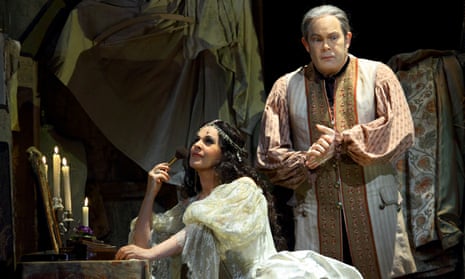David McVicar’s beautiful production of Francesco Cilea’s Adriana Lecouvreur was created in 2010 as a vehicle for Angela Gheorghiu and, originally, Jonas Kaufmann. This is its first revival, and Gheorghiu’s return to the role of the Comédie Française actress for whom the boundaries between life and art become catastrophically blurred also marks the 25th anniversary of her Covent Garden debut. This time, however, she is paired with the US tenor Brian Jagde, strikingly cast as Adriana’s feckless lover, Maurizio.
Smaller-voiced than many Adrianas, Gheorghiu brings deep vulnerability to bear on a role sometimes delivered Tosca-like by fire-breathers, though she took time to settle on opening night and Jagde, full-on and thrillingly loud, dominated their opening duets. She struck form in the second half, however: the climactic scene in which Adriana inflects a tirade from Phèdre so as to publicly insult Maurizio’s vindictive ex, the Princess de Bouillon (Ksenia Dudnikova), really hit home; Poveri Fiori was exquisite.
Like Jagde, Dudnikova proves to be a real find. There’s beauty as well as power in her lower registers, and her characterisation was implacable in its hauteur. Gerald Finley, meanwhile, turns Michonnet, the stage manager who loves Adriana from afar, into a touching figure rather than playing him for laughs. We could do with a better conductor than Daniel Oren, though. Cilea’s grand passions sounded more Wagnerian than necessary, and the gossipy rococo frippery that offsets the central tragedy needed more sparkle and grace.
- In rep at Royal Opera House, London, until 2 March. Box office: 020-7304 4000.

Comments (…)
Sign in or create your Guardian account to join the discussion